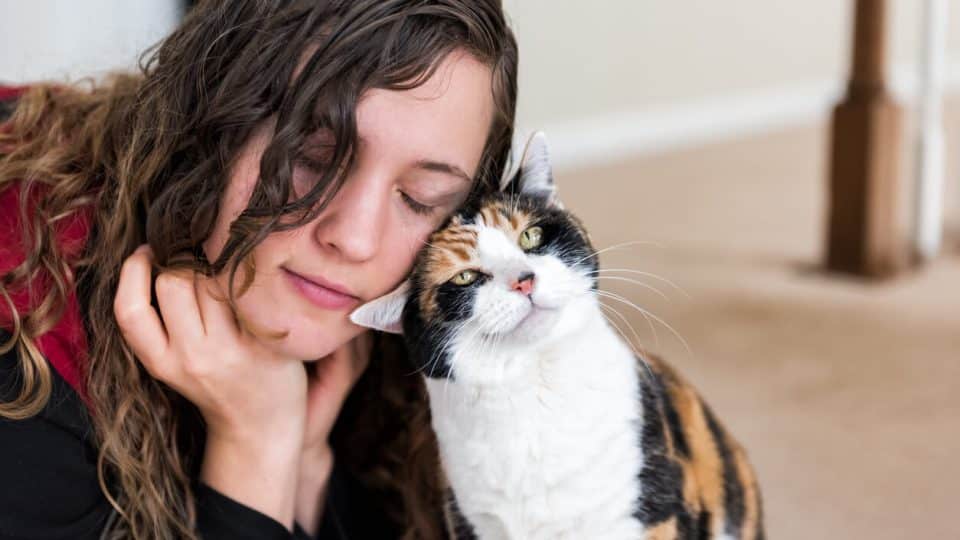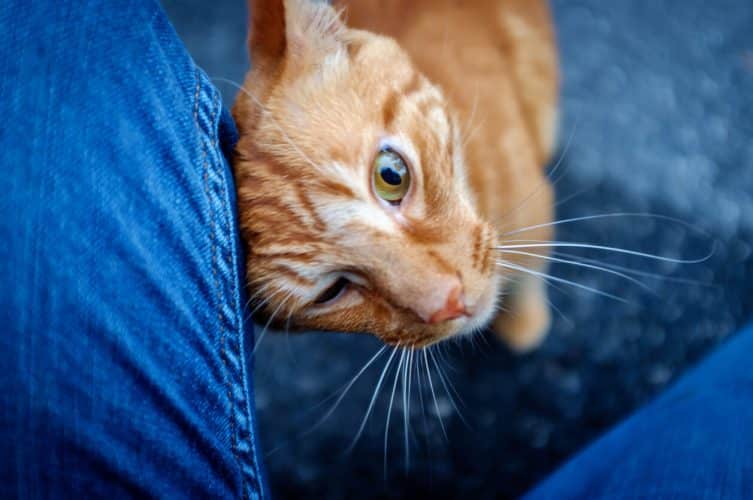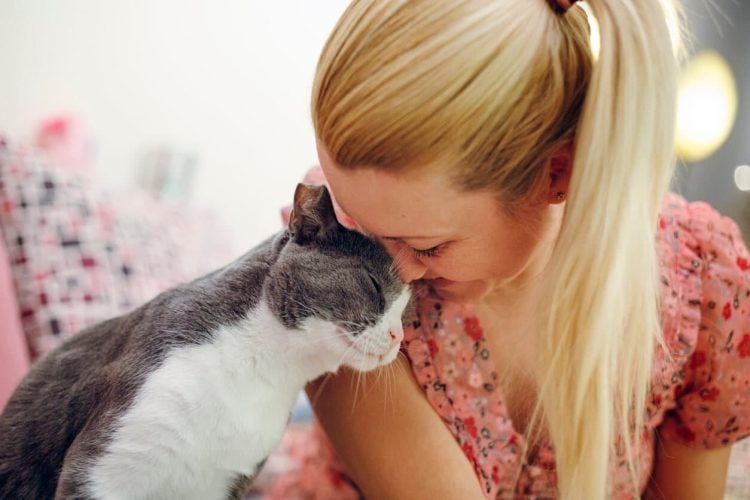Generally, cats headbutt as a sign of affection.
“When a cat headbutts you, it’s most likely a behaviour called ‘bunting,’ which is the cat’s way of saying they like you and want to leave their scent on you,” says Joey Lusvardi, certified cat behaviour consultant and owner of Class Act Cats. “It’s a very affectionate behaviour. So if you are on the receiving end of a bunt, you should take it as a huge compliment!”
Responding to your cat’s love bonks can help deepen your bond and show them you return the sentiment.
Below, find out why cats like to headbutt and get tips on how to share the love with your feline friend.
What Does Cat Head Bunting Mean?
The root cause of your cat’s bunting lies in their sense of smell.
“Cats have special scent glands on their head, cheeks, and chin,” says Dr Shannon Barrett, veterinarian and owner of Fetch The Wave. These glands contain your cat’s pheromones, chemical signals that carry your cat’s unique scent.
Humans can’t smell feline pheromones. But they’re an important communication method for other cats. In fact, cats that live together often rub and bunt against each other to mix their pheromones and create a group scent.
“It’s like a secret handshake, but with their faces,” Dr Barrett says.
“If our cats’ scents were visible to us like a bright blue dye, I think we would all be shocked by the ocean of colour around us,” says Stephen Quandt, a certified feline training and behaviour specialist and founder of USA-based Cat Behavior Help.
Other reasons cats bunt include:
Marking their territory
Cats will often rub against objects to mark their territory. They often do this in locations that are important to them, or in spots where other cats may find them, Lusvardi says. In other words, they’re making sure that other cats know who your house really belongs to.
Similarly, by bunting you, your cat is essentially marking you as their human!
Asking for attention
“Cats who bunt you may also be asking for something specific,” says Quandt. So, check to see if your cat’s headbutts are accompanied by other clues. For example, if your cat bunts you and then leads you to their food bowl, they may want a refill.
Soothing themselves
Some cats may also bunt as a way to comfort themselves, Quandt explains. It’s similar to when they ‘make biscuits‘ on their favourite blanket—or your best jeans.
Head Bunting vs. Head Pressing: What’s The Difference?
While head bunts are typically nothing to worry about, they can resemble head pressing. This rare behaviour often signifies neurological damage in cats.
If you ever see your cat pressing their head against a rigid surface, like the wall or a table leg, you’ll want to get them to a vet right away. Bunting is typically a press and release—or butt and release, if you will. It’s only cause for concern if your cat continually puts their head against an inanimate object and keeps it there.
“Other concerning signs are seizures, changes in vision, compulsive behaviours, or disorientation,” says Lusvardi. If you notice head pressing along with any of those signs, call your vet right away.
How to Respond to a Cat Headbutt
When your cat butts you, they may not want you to literally head bunt them in return. (Although, you can certainly try, gently.)
Dr Barrett says petting your cat can stimulate the scent glands in their head. “Not only does this allow their scent to be transferred to us, but it also relaxes your cat.”
That said, pets or scratches after a headbutt might not necessarily be what your cat wants.
“Cats can do a lot of behaviours to try to elicit something from you,” says Lusvardi. This is especially true if you’ve given them something in response to the behaviour in the past.
For example, if you previously responded to your cat’s head bunts with treats, they might make the connection between the two and bonk you the next time they’re hungry.
How to (Gently) Return Your Cat’s Headbutt
If you get a headbutt from a cat, here’s how to respond in a cat-friendly way:
- Be appreciative. First, take a moment to appreciate the gesture. After all, your cat basically just kissed you with their forehead.
- Give some love. Cats often prefer petting around their neck and head. But pay attention to your cat’s body language to check whether they’re positioning themselves for pets in a certain spot, like under the chin.
- Know when to stop. Once you’ve started petting, watch your cat’s body language for subtle signs they’ve had enough attention, like tail twitches. If you miss their subtle cues, they might escalate with a more definitive signal, like biting.
The more you pay attention to your cat’s body language and responses, the better you’ll get at returning the love in the way your cat wants. “Recognising subtle signs is essential to a happy cat-pet-parent relationship,” says Dr Barrett.
How do other pets respond to cat headbutts?
You’re not the only creature in the house your cat might bonk every now and then. Sometimes, they might also headbutt a dog to mix scents and show their affection.
Dogs don’t generally bunt each other like cats do, so they may interpret headbutts differently, Quandt says. A dog might interpret it as a friendly gesture if they have a good relationship with the cat. But if they’re nervous or skittish around the cat, they might not view physical contact as a positive thing.
In general, if your cat brushes against your dog and your dog returns the gesture with a lick, it’s safe to say your pets have found a way around the body language barrier, Quandt says.
How Do Cats Show Affection Besides Head Bunting?
Besides headbutting, cats might show affection in the following ways:
- purring
- slow blinks
- showing you their tummy
- climbing in your lap
- sleeping on you
- bringing you ‘gifts’
“Each cat, like us, is an individual,” Barrett says. While some cats may be all about head bunts, another may prefer to express their love in another way. But if your cat exhibits any of the above behaviours, you can rest assured you’ve got a happy kitty on your hands.





